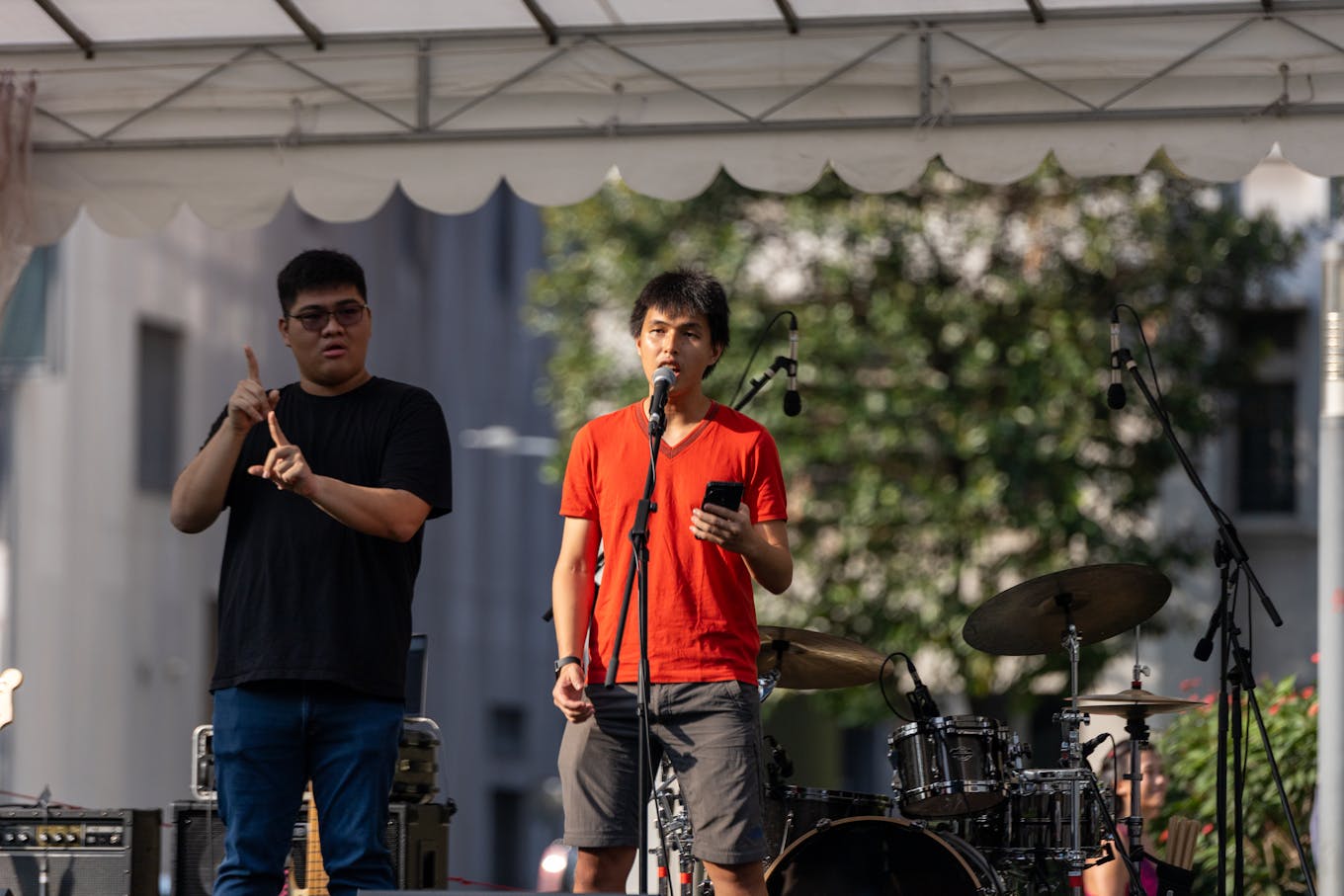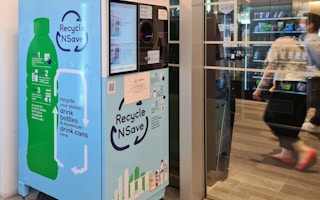A speech at Singapore’s climate rally last month delivered by an activist has re-ignited speculation that there is a reason why a “polluter-pays” scheme that would make manufacturers responsible for the full lifecycle of their products is taking so long to come to fruition: industry lobbying.
The idea that companies must pay for managing the waste created after consumers have used their products – a concept known as Extended Producer Responsibility (EPR) – was mooted in Singapore close to two decades ago, but questions are still being asked about why it has been delayed. The approach currently only applies to e-waste manufacturers and will be extended to cover aluminium drink cans and plastic bottles in the form of a beverage container return scheme in April 2025.
Civil society representatives that Eco-Business spoke to say that, over the years, there has been a lack of accountability to stakeholders beyond industry, which has led to unnecessary speculation. The Singapore Manufacturing Federation (SMF), which represents the interests of the island’s manufacturing industry, including the packaging sector through the Packaging Council of Singapore told Eco-Business it is “not involved with the delay of the EPR scheme”.
To continue reading, just sign up – it’s free!
- Get the latest news, jobs, events and more with our Weekly Newsletter delivered to you free.
- Access the largest repository of news and views on sustainability topics.
- You can publish your jobs, events, press releases and research reports here too!
Newsletter subscribers do not necessarily have a website account. Please sign up for free to continue reading!
In its reply, SMF said that the council is in alignment with the directions set forth by the National Environment Agency (NEA), the formal authority that consults with industry on the EPR framework. “As the association for the packaging industry, we proactively advocate for our members to embrace sustainable practices and optimise the materials used in their packaging,” said May Yap, chairman of the packaging council.
In its response to Eco-Business, Singapore’s environment agency did not confirm or refute the claims made at the climate rally but said that in developing policies to manage packaging waste, it “studies what is done in other jurisdictions, consults industry and adopts practical measures that are suited to the local situation.”
Voluntary agreement for producers ‘useless’: activist
The charges against the packaging industry were made in a speech at the climate rally last month by co-founder of environmental campaign group LepakInSG Ho Xiang Tian. Ho said that when NEA first said it was considering the EPR scheme in 2005 as a solution to the country’s waste burden, the packaging industry had “blocked” that and proposed a voluntary initiative called the Singapore Packaging Agreement (SPA).
Ho described this programme, which has attracted criticism from industry observers in the past for lacking “teeth”, as “useless”, saying that “it reduced less than one per cent of packaging waste in Singapore over the 13 years it was active”.

At SG Climate Rally 2023, co-founder of environmental campaign group LepakInSG Ho Xiang Tian (right) said in his speech that the packaging industry had blocked the Extended Producer Responsibility Scheme when the country’s environment agency said about 20 years ago that it was considering the approach. Image: Firdaus Firlany
Referring to Singapore’s one and only landfill that is expected to be full by 2035, he said: “In the meantime, Semakau landfill is running out of space. And when a new landfill has to be built for our waste, it is the taxpayers that will pay for it, not the packaging industry which has been profiting off this.”
There are currently no plans to build new landfills in Singapore, but the authorities of the land-scarce city state have been looking into prolonging Semakau’s lifespan.
EPR schemes exist in other developed countries such as Sweden, where the concept was born in 1990, as well as in Germany, Japan, Taiwan and South Korea. Recycling rates have increased in every country where EPR policies have been introduced. For a developed country, Singapore’s domestic recycling rate is low – and reached a 10-year low last year.
Packaging waste accounts for about one-third of Singapore’s domestic waste stream. More than half (55 per cent) of Singapore’s packaging waste is made from plastics, just 6 per cent of which was recycled in 2022. The rest is incinerated.
Singapore’s long road to EPR
2005: The government suggests that Singapore should adopt the EPR principle to reduce waste during a review of its Singapore Green Plan.
2007: A voluntary joint initiative known as the Singapore Packaging Agreement (SPA) was launched instead, with an increase in costs that would eventually be passed on to consumers reportedly cited as the main barrier to an EPR policy.
-Under the voluntary programme, the industry would work with the nation’s environment agency to reduce packaging over a 5-year period.
2018: Singapapore Parliament discusses the EPR scheme.
2019: Singapore’s inaugural Zero Waste Masterplan, which mentions regulatory approaches, including the EPR scheme for packaging waste, is launched.
2020: SPA concludes.
- Under the voluntary initiative, NEA says more than 200 organisations had cumulatively saved around 62,000 tonnes of packaging waste, amounting to S$150 million (US$110 million) in costs.
2021: The Mandatory Packaging Reporting (MPR) scheme and an industry-led Packaging Partnership Programme (PPP) are introduced. An EPR scheme for e-waste officially kicks in.
2023: A disposable carrier bag charge is implemented across two-thirds of supermarket outlets islandwide.
2025: The EPR will be extended to beverage containers. NEA says it is studying the feasibility of applying the approach to broader packaging waste types.
In its reply, NEA listed out a detailed timeline of how it gradually extended the EPR scheme, while explaining that the SPA was “a first step to build up industry awareness and capabilities in reducing packaging waste”.
Statistics it cited indicate that more than 200 organisations had cumulatively saved around 62,000 tonnes of packaging waste, amounting to S$150 million (US$110) in costs. This is more than 10 per cent of domestic packaging waste thrown out in Singapore, according to Eco-Business’ calculations.
SPA concluded in 2020 and was replaced in 2021 by a scheme that mandated packaging reporting, and in the same year the industry-led Packaging Partnership Programme (PPP) launched to encourage businesses to reduce waste.
In the order of events it cited, NEA highlighted how the introduction of a price on plastic bags in two-thirds of supermarkets on the island in July this year serves as a “behavioural nudge” on the consumer front. It said that beyond beverage containers, it is studying the feasibility of applying the EPR scheme to broader packaging waste types, and emphasised that this will be done so with an approach similar to what it has taken so far – with consideration of Singapore’s local context through consultation with relevant stakeholders.
“Such proper planning helps to achieve desired outcomes in a more effective and sustainable manner,” said the agency.
Consumer buy-in
Sources Eco-Business spoke to for this story said that the industry has previously voiced concern over the quality of recyclables they would be required to use in their products from an EPR scheme.
High contamination rates of packaging disposed of in Singapore’s recycling bins – around 40 per cent of recyclables are unrecyclable because they are too dirty or wet, according to NEA data – and the lack of recycling infrastructure in the land scarce country were among concerns raised.
On the other hand, the beverage container return scheme, initially slated for launch in 2022, has faced numerous delays, reportedly due to industry requests for more time to prepare.
One of the most outspoken voices on EPR in Singapore, according to sources familiar with the process, has been Coca-Cola, a company that has opposed beverage return schemes in other jurisdictions including Australia, Europe and the United States in the past.
In a statement to Eco-Business, the soft drinks brand said it supported the introduction of a “well-designed” beverage container return scheme in Singapore.
Such a scheme should be “consumer-focused and ensure environmental, social, and economic viability, which will require strong cooperation from a wide range of stakeholders, including the government, industry, retailers, and consumers,” the company said.
Huileng Tan, executive director of waste reduction non-profit Zero Waste SG, said that the concept of a deposit refund scheme was mooted in 2019, and even after the scheme was announced to start in 2022, there was little progress.
“The go-live date was pushed back to 2023, 2024 and now 2025, without much reason given,” she said, adding that it has been difficult to find public information on the expected timeline that the authorities had previously announced.
“More consistent and thorough engagement on the topic would raise the accountability to stakeholders beyond industry, reduce speculation that more easily comes with the lack of information, and perhaps do better justice to any preparation work that is taking place in the lead up to 2025,” she said.

















